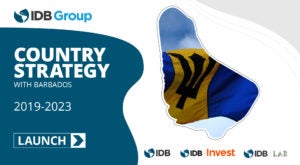For 50 years the Inter-American Development Bank has been partnering with the people of Barbados. Now, at a crucial time in its history, this relationship is stronger than ever. As Barbados’ leading multilateral partner our relationship with the island nation extends far beyond its present macro-economic reform agenda. We’re looking ahead to the next 50 years, taking it five years at a time. On April 11th, 2019, the Board of Directors of the IDB Group approved the 2019-2023 Country Strategy with Barbados.
The IDB Group Country Strategy: What is it?
The Country Strategy is a document that reaffirms the IDB Group’s commitment to continue supporting the country, presenting proposed areas of engagement that respond to challenges for growth. All of the Bank’s projects which are approved during the period of a Country Strategy must be aligned to it. The previous Country Strategy with Barbados (2014-2018) outlined tourism, transportation and logistics, energy and integrated coastal zone management and climate resilience as its key areas of engagement.
What are the priority areas of engagement proposed in the 2019-2023 IDB Group Country Strategy?
The 2019-2023 Country Strategy with Barbados builds on the IDB Group’s previous engagement, it responds to the current challenges faced by the country and reflects the new reform agenda proposed by Prime Minister Mottley’s administration.
Our short-term aim is to promote a fiscally sustainable growth path that protects the vulnerable. We propose to support fiscal consolidation efforts as well as reforms of underlying public sector management and public financial management structures of government. We also aim to continue protecting the vulnerable through social protection and education, which are sectors where we hold a long-standing engagement with the country.
In the medium term, we aim to support the government’s long-term growth vision by:
-
- Carrying out initiatives that tackle climate change and natural disasters, both through adaptation and mitigation measures.
- Promoting the modernization and digitization of the state, hand in hand with fiscal reform efforts.
- Investing in greater productivity and competitiveness. We propose to do so through reforms to the regulatory framework for a stronger business environment, mechanisms to improve access to finance, as well as through resilient infrastructure investments in key sectors for the economy such as energy.
- Continued protection of high social outcomes and gender equality, particularly in response to the changing needs of the population.
What does this mean for Barbados?
The Country Strategy outlines and reaffirms our commitment to Barbados’ growth and development throughout the next five years, building on the Bank’s 50-year history of engagement in the country. In practical terms, it sets a framework for the Bank’s support in Barbados, currently amounting to almost 50% of total multilateral funding.
Our ultimate goal is to contribute to the improvement of the lives of all Barbadians, in line with the Government’s strategy and in a way that maximizes our value added in the country. We look forward to continuing supporting the Government of Barbados and its people through this time of change and reform, providing funding, new ideas and partnerships with enthusiasm, commitment and determination.
Want to find out more?
Check out our new e-brochure, which provides an interactive approach to portraying our vision of engagement with the country at www.iadb.org/BarbadosCS2019



Leave a Reply